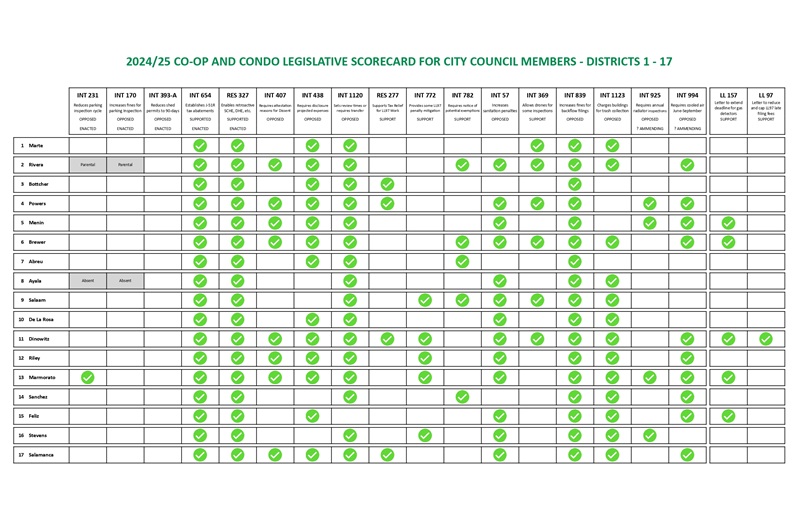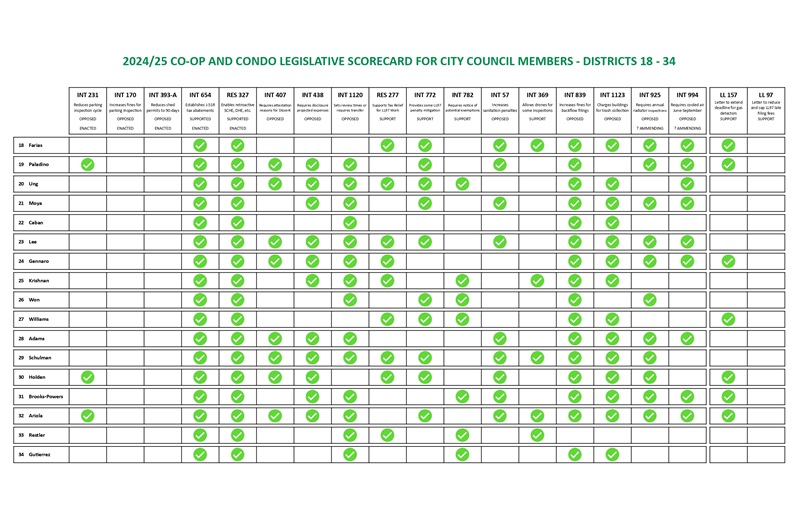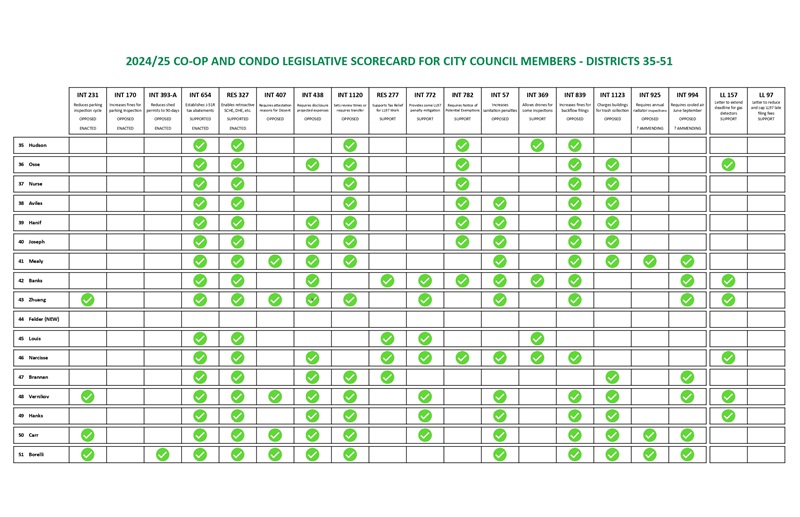HOW TO FIND YOUR CITY COUNCIL MEMBER
SWIFT SUCCESS -- A.8337 HAS BEEN WITHDRAWN
Great news! Assembly Member Rosenthal “struck the enacting clause” of this bill today, removing her support, and in essence deleting the bill. We accomplished this TOGETHER! Thank-you to everyone who reached out to their elected officials and spread the word to others. Our voices were heard! Let’s continue standing up for our rights as homeowners.. Stay tuned for our end of session update next week.
HELP CNYC DEFEAT DETRIMENTAL LEGISLATION
On June 11 the New York State Senate passed a bill that would allow the Attorney General’s office to void the Offering Plans of co-ops/condos that do not:
(1) promptly provide all shareholders/unit owners with digital and physical copies of all inspections, reports and permits completed to comply with building codes as soon as they are filed, conducted or amended, and
(2) provide copies of recent engineering reports, inspections and permits to prospective purchasers - including exploratory reports such as energy audits.
It is urgent that this bill does not pass in the Assembly.
As defined in the legislation, inspections, reports and permits cover a huge swath of items (see partial lists below), and the required distribution to shareholders/unit owners would present a tremendous hardship and add to costs.
Providing prospective purchasers with access to engineering reports used as working documents by boards trying to make educated decisions and set capital plans would greatly devalue co-op/condo properties.
The punishment for failure to comply with the administrative requirements of this legislation is extreme and would harm all shareholders/unit owners in the building.
Revocation of a building’s offering plan could jeopardize the following:
- share/unit and underlying loans
- insurance coverage
- the ability of the board to act, and
- basic governance ability.
While disclosure is inherently important, this is not the way to achieve it.
The bill seeks to improve public safety and prevent disasters such as what happened at the Champlain Towers in Florida. New York City has some of the most stringent regulations in the United States to ensure building safety, including the façade inspection and safety program, parking structure inspection and repair requirements, retaining wall inspection requirements, parapet wall inspection requirements and gas-piping inspection and repair requirements.
It is in the interest of every New York City shareholder and unit owner to ensure the bill does not pass as written.
CNYC urges you to contact your assembly member immediately and ask them to oppose the bill.
A link to the bill and information on what constitutes “inspections, reports and permits” under this law follows below. For a copy of our full testimony please email [email protected].
FIND MY ASSEMBLY MEMBER:
https://nyassembly.gov/mem/search/
LINK to S.7541/A.8337
The legislation defines an “inspection”
as any report completed to ensure a co-op/condo meets local building codes, health and safety standards, and fire codes, or to evaluate if a property has significant mechanical or structural damage.
By that definition, New York City co-op and condo boards would have to provide all shareholders and unit owners with copies of reports on all building, health and fire code issues, including:
- Evaluation of window guard notices and installations
- Lead paint reports
- Emergency preparedness notices
- Fire safety notices
- Carbon monoxide, smoke and natural gas leak detector installations
- Central air conditioner inspections
- Domestic water tank inspections
- Cooling tower inspections
- Elevator inspections
- Sprinkler system inspections
- Back-flow prevention device inspections
- Bedbug reports
- Boiler inspections
- FISP reports and change orders
- Gas-piping inspections
- Oil tank inspections
- Signage inspections
- Retaining wall inspections
- Parapet wall inspections
- Parking structure inspections
- Energy use and efficiency reports
- Retrocommissioning audits
- Energy audits for LL97 compliance
- And much more
The legislation defines “engineering reports”
as any report completed by a certified engineer or architect for the purpose of evaluating if a property has significant mechanical or structural damages.
This would include, among other items:
- FISP reports and related probes
- Parking structure reports
- Gas-piping inspection reports
- Elevator inspection reports (if done by an engineer)
- Boiler inspection reports (if done by an engineer)
- Capital plan assessments (if done by an engineer)
- Retaining wall inspections
- Parapet wall inspections (if done by an architect or engineer)
- Evaluations of plumbing and other mechanical systems (if done by an architect or engineer)
- Evaluations of roofing systems (if done by an architect or engineer)
- Evaluation of windows (if done by an architect or engineer)
The legislation defines “permit”
as any approval issued by the state or city authorizing the property manager, a consultant or an agency to conduct renovations, repairs or remediation in the co-op/condo.
This list is also extensive.
Please contact your assembly member immediately and ask them to oppose passage of A.8337. The Assembly will be in session through Tuesday.
FIND MY ASSEMBLY MEMBER:
https://nyassembly.gov/mem/search/
LINK to S.7541/A.8337
Co-ops and condos are comprised of and governed by homeowners who have invested heavily in New York City and have built up and stabilized countless neighborhoods. With New York now facing the potential loss of funding and federal programming, its homeowners have an important role to play, but that will only be possible with the City Council's help. While CNYC members generally align with their City Council members on policy goals, there is a consensus that we are at a tipping point due to recently enacted legislation, rules and regulations, and that more attention must be paid to the needs of co-op and condo constituents.
CNYC has two new advocacy programs:
- An ongoing "Coop and Condo Legislative Scorecard" that will highlight bills with the potential to impact co-op and condo homeowners and indicate which city council members have voted for/are sponsoring those bills.
- A grass roots advocacy effort that includes in-person Town Halls throughout New York City's council districts.
If you are interested in participating in CNYC's advocacy efforts or serving on an advocacy committee, please contact our office to learn more.
LEGISLATIVE SCORECARD
CNYC's Co-op and Condo Legislative Scorecard Focuses on Co-op/Condo Needs
CNYC Urges City Council Members to Analyze How Legislation Impacts the Affordability and Viability of Co-op and Condo Homeownership
As City lawmakers opt to tackle quality-of-life, safety, and climate issues through sweeping legislation and mandates, homeowners in cooperatives and condominiums are being caught in the crosshairs. The unanticipated and non-negotiable expenses attached to complex and costly compliance requirements are taking a heavy toll in the form of increased carrying charges, capital assessments, and expanding underlying debt. Middle-class and fixed-income co-op and condo homeowners are struggling to meet their financial obligations; some can no longer afford to live in the cooperative or condominium that was the home they had chosen, their little piece of New York City.
In response, CNYC has introduced its first Co-op and Condo Legislative Scorecard to draw attention to proposed bills and resolutions that will impact the viability of co-op and condo homeownership.
In developing the 2025 Co-op and Condo Legislative Scorecard, CNYC reviewed and chose legislation based on the following questions:
- Does it support or diminish co-op and condo governance?
- Does it increase or decrease the cost and complexity of compliance?
- Does it recognize that co-op shareholders and condo unit owners are homeowners, not renters or landlords?
- Will it impact the affordability and viability of co-op and condo homeownership?
CNYC has indicated the voting/sponsorship record of each city council member for the selected bills in green on the chart when the city council member's position aligns with CNYC's position. While the first five items - Int 231, Int 170, Int 393-A, Int 654 and Res 327 - have already been enacted, the remaining eleven bills and one resolution are still in committee. Further, Council Member Dinowitz is still working to have his colleagues sign onto the two letters included on the scorecard that seek to address urgent issues through rule change.
CNYC will update the scorecard to reflect changes in sponsorships/votes. If bills are amended, CNYC will review the changes based on the questions above and adjust the scorecard accordingly. New bills will be added to the chart quarterly, and CNYC will provide position papers on same.

DOWNLOAD CNYC 2025 CO-OP CONDO SCORECARD-CD 1-17

DOWNLOAD CNYC 2025 CO-OP CONDO SCORECARD-CD 18-34

DOWNLOAD CNYC 2025 CO-OP CONDO SCORECARD-CD 35-51
CNYC's Efforts to Ensure That
Co-op Shareholders and Condo Unit Owners
Are Recognized as Homeowners
Receive Massive Boost in NYS Budget
Last night New York State passed its budget for fiscal year 2026, which includes funding specifically for the "purchase and installation of energy efficient equipment...'' in "residential apartments owned as a residential cooperative apartment or a condominium unit.''
This budget line marks the success of the first part of CNYC's long term push to obtain incentives for qualifying shareholders and unit owners that are equal to those offered to qualifying single-family homeowners. The importance of the State's willingness to recognize that co-op shareholders and condo unit owners are individual homeowners with unique economic needs and means is tremendous! The funding this budget sets aside for shareholders and unit owners will help seniors on fixed incomes and other LMI shareholders and unit owners remain in their homes while their co-ops and condos take on legislatively mandated energy efficiency work.
CNYC now looks forward to working with NYSERDA to develop the specific programming to ensure that these funds help as many qualifying shareholders and unit owners as possible.
|





